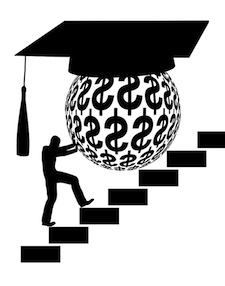By Caitlyn Ewers
Working in conjunction with Creighton University’s Honors Program, the Beta of Nebraska Chapter of Phi Beta Kappa facilitated a forum on the ever-increasing price of American higher education on September 23. Speakers represented various academic and professional backgrounds and included professors, administrative faculty, and a student respondent drawn from the university’s undergraduate College of Arts and Sciences. The discussion occasionally grew heated as students and faculty voiced general concerns and, in some cases, personal affront at the challenges presented by the high price of a college degree; audience members and panelists alike described the consequential hardships endured by modern students of higher education and, at the same time, worried that many ostensibly attractive cost-saving options could debase the education championed by respected liberal arts institutions.
The forum was opened by the sole student panelist, Creighton undergraduate Molly Anne Krebs, who described anecdotally the financial ramifications her decision to be educated at a private, four-year university. Her brief narrative was followed by a presentation by Gail Jenson, Ed.D., the Vice Provost and Dean of the Graduate School, and Mary Chase, Ph.D., the Director of Admissions, who explained the “cost disease” plaguing American colleges, outlined a number of factors influencing the ever-increasing cost, cited the rates at which tuition is increasing at public two-year, private four-year, and public four-year schools. Chase then shared various statistics on, among other things, average tuition discounts provided by universities and the declining purchasing power of federal Pell Grants and Stafford Loans. The general message seemed to be that inefficiency and decentralization within university systems, combined with other factors such as decreasing state support, are the primary drivers of tuition hikes. Even as the price of an education rises, the purchasing power of federal grants and loans is falling. While universities are raising their average tuition discount, they are doing so at a rate which is not sustainable. Jensen concluded with a description of optimistic, if nonspecific, strategies which might ameliorate the problem: she stressed that the impetus must come from faculty and students, the true heart of any educational institution, and that collective action and a sense of university-wide shared responsibility are key.
The final three speakers—professors Erika Kirby, Ph.D., Phi Beta Kappa member Randall Crist, Ph.D., and Phi Beta Kappa member Gintaras Duda, Ph.D.—represented Creighton’s undergraduate College of Arts and Sciences and offered their thoughts on several specific programs and practices which might alleviate the costs burdening students of higher education. These were primarily options which enable students to earn credits in a non-traditional (and therefore inexpensive or even free) setting such as in a massive online open course (MOOC) or to have credit retroactively awarded for college-level learning acquired from work experience, independent study, etc. The panelists examined the flaws of each alternative, for instance acknowledging the challenges of creating reliable and consistent methods of Prior Learning Assessment (PLA) and wondering at the effect of credit transfer and self-guided learning on the traditional collegiate liberal arts experience.
Creighton University’s forum on the soaring price of American higher education confronted an issue that, while already well-known and highly publicized, is rarely examined in such detail, even on university campuses. In the open discussion following the presentations, audience members’ contributions demonstrated that many students and faculty alike feel their institutions do not acknowledge the problem in all its severity. The strategies and solutions described by the panelists, although anything but simple fixes capable of slashing tuition without altering the nature of a traditional college education, provided a platform from which the necessary change might be conceived.
Caitlyn Ewers is a senior at Creighton University majoring in Latin and art history. Creighton University is home to the Beta of Nebraska Chapter of Phi Beta Kappa.




